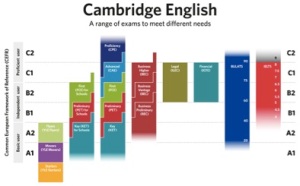Exams, exams, exams
Everyone hates taking exams, and for ESL students it is no different. They can be difficult, frustrating and long. However,  there are many things you can do to make taking these exams easier and more bearable for your students. This blog will look at hints and tips as well as an explanation of the exams so you can help your students overcome this demon!
there are many things you can do to make taking these exams easier and more bearable for your students. This blog will look at hints and tips as well as an explanation of the exams so you can help your students overcome this demon!
What is the FCE and CAE exam?
The FCE and CAE exams test students’ language ability and skills with the language at a high level and is graded using the Common European Reference for Languages (CEFR). Not only must they have a good grasp of the language, but they must know its use, how it is applied as well as form and function. Each part of the exam is different and will test them on different skills and language ability.
Most universities, especially those abroad, are now asking for an FCE level of English in order to be accepted so, as you can imagine, the FCE and CAE exams are very important in helping a student advance and travel to different countries for work or study. It is an internationally recognised exam and having it will benefit your student greatly.
There are 4 parts to the FCE and CAE exams:
- Reading and Use of English (previously separate now combined) – these test both specific and general reading skills, grammar and vocabulary knowledge and use
- Writing – this tests students’ ability on a range of different topics and writing styles. Part 1 – the essay is compulsory; whereas part 2 is a multiple-choice option where students can choose the topic and type of writing they want from a list of 5 options.
- Listening – this tests student’s ability to listen to general and specific information in order to answer sets of questions.
- Speaking – this tests student’s ability to speculate as a group, describe different scenarios, discuss possibilities, interact with each other and make decisions all whilst justifying and giving reasons for their ideas.
Sounds easy right? Well for a native it probably is, but for an ESL learner this can be very challenging and frustrating. So, what can we do to help?
A teacher taking an exam?!
Without taking the FCE and CAE exams yourself, you can’t possibly begin to understand what students have to go through or the amount of  knowledge and skills they need to develop. You can find multiple online exams that give you results and let you know where you went wrong. As you’re taking the exam, make notes on what you did and how you did it. Of course, we’re more likely to know the answers because we speak the language, but ask yourself questions such as – how did I know this was the correct word? How did I re-write this sentence? How did I find the answer so quickly? Break down each answer and section of the exam; you can then pass on this knowledge to students to help them. Plus, they’ll also feel much better knowing their teacher has been through the exam procedure and understands it from a student’s point of view.
knowledge and skills they need to develop. You can find multiple online exams that give you results and let you know where you went wrong. As you’re taking the exam, make notes on what you did and how you did it. Of course, we’re more likely to know the answers because we speak the language, but ask yourself questions such as – how did I know this was the correct word? How did I re-write this sentence? How did I find the answer so quickly? Break down each answer and section of the exam; you can then pass on this knowledge to students to help them. Plus, they’ll also feel much better knowing their teacher has been through the exam procedure and understands it from a student’s point of view.
A theme a day keeps memory loss away
Choosing the right theme for a class can go a long way and it is often the best place to start before deciding what parts of the exam you will study in class.
Keep one theme throughout each class – just because the book jumps from space exploration, to media culture, to food, to weather in one class does not mean you have to. Jumping from different themes will not only make it difficult for the student to keep up, but it will also make it harder for them to remember parts of the exam.
I’ve often overheard students when taking the exam in class remarking:
‘Oh yes, I remember this part, this is when we studied technology and inventions/the environment/celebrities’
It will be easier for them to recall parts of the exam and skills taught by remembering the theme you used in class. Which brings us onto the next point.
Get creative!
So, we’ve chosen our theme but, to our dismay, we find that the book doesn’t contain any exam parts that link with this theme, what is a teacher to do? Well, what teachers do best – create their own resources!
A simple set of lyrics or news report can be adapted and made into many different parts of the exam. Last week I used lyrics from a video, which I adapted to work with three of the parts of the exam my students had coming up that week, as well as helping them practice the different speaking parts. It took five minutes and worked far better than anything I had available in the book.
A good video is a great source for listening activities and will engage and interest students more than listening about how plastic is made. Again, the aim is to provide something interesting and fun for your students to help them remember when they come to do the official exam.
I got mad skills!
Providing students with skills will go a long way in the exam, especially if your students have problems with timing. Flipping the reading around can reduce students’ time and give them a higher chance at finding the correct information. How many times have you seen a student spend ten minutes reading some text, making sure they understand every single word? Well, in the exam you have twelve minutes to read the text, read the questions and find the answers. Not long right? Flip this; students do not need to read the text. The questions are the most important and this is where students should spend most of their time and understanding. I have developed my own set of skills that I have passed down to students, these skills not only helped the student half the time it took them, but they got over 90% of answers correct. Oh, and, they did not actually read the text in full!
You will find your own set of skills that you can develop and pass on to students – this is why it is important for the teacher to take the exam. Reading the ‘How to do it’ section will also help, as will attending as many seminars as you can. These are gold mines of information and you will also come out with a new idea or skill to pass on to your students.
Practice makes perfect
As with any new skill, the more you practice the better you get. This is no different for the FCE and CAE exams, just not quite as fun as honing your football or yo-yo skills. Always give your student a copy of the parts you have studied in class to take home and do as homework. Ask them to practice the skills and time themselves, so then, when you come to the next class, you can ask students to compare their answers, times and discuss how they found the information and the skills they used. You never know, students might develop their own skill, which you can adapt and use next time. Remember, all students are different and will approach each part of the exam in a different way. Ensure you have a variety of skills and knowledge to pass on to your students for each part as well as practice at home, and remember, be patient.
fun as honing your football or yo-yo skills. Always give your student a copy of the parts you have studied in class to take home and do as homework. Ask them to practice the skills and time themselves, so then, when you come to the next class, you can ask students to compare their answers, times and discuss how they found the information and the skills they used. You never know, students might develop their own skill, which you can adapt and use next time. Remember, all students are different and will approach each part of the exam in a different way. Ensure you have a variety of skills and knowledge to pass on to your students for each part as well as practice at home, and remember, be patient.
Exams are not fun, or easy, I’m sure we all remember countless nights studying and revising for the next day, but hopefully these hints and tips will help to make the process easier and better for your students.
By Morgan Dalzell








Leave A Comment